Today we try to figure out what happens when our future presidential candidates have thousands of Tweets and Tumblr posts and Instagrams in their online record.
What happens, when today’s teens start running for office? When their entire internet history is there, searchable, for us to read? What if these teens Tweet something at 15 that they might regret at 45? Do we learn to accept that their opinions have changed? Or do we go through every candidate’s entire social media history to find dirt on them? Does that tactic still work in the future? Or do we all just throw up our hands and admit that teens have bad opinions and that hopefully those opinions have changed?
To find out, I talked to a real live young person with political ambitions, Eve Zhurbinskiy a student at George Washington University. She describes her own social media strategy, and how she never Tweets without thinking about how it might come back to bite her. She also talks about going back and deleting Facebook posts and even in one case her entire Tumblr because she thought it might be used against her.
And that’s not paranoid, I also talk to someone who tracks that kind of thing among politicians. Josh Stewart from the Sunlight Foundation explains what Politwoops is and why they’re tracking the deleted Tweets of politicians.
And to round things out this episode I talked to someone who’s got a lot of experience managing digital campaigns for today’s politicians. Laura Olin was one of the first hires for Obama’s 2012 digital team, and she not only ran the Obama Tumblr, but she also actually Tweeted as the President.
Throughout the episode we discuss all kinds of questions about how we think about and forgive humans.
In March of this year, a State Supreme Court justice from Wisconsin named Rebecca Bradley issued an apology for some columns that she wrote 24 years ago in a student newspaper. In the columns she referred to gay people as “queers” and called people with AIDS “degenerates who basically commit suicide through their behavior.” She also said that it would be better to get AIDS than cancer, because, quote “those afflicted with the politically correct disease will be getting all of the funding.” And that abortion is like the Holocaust and slavery.
Bradley says that she was, quote “frankly embarrassed at the content and tone of what I wrote those many years ago” but she also said that when she wrote them, she was “a very young student.” Now the release of these 24 year old columns wasn’t random, the organization that found the columns unveiled them just a month before voters in Wisconsin would vote on whether or not Bradley should retain her seat on the court.
People who wanted Bradley off the court, said that the comments in the columns were so hateful that time didn’t really matter. People who wanted Bradley to say said that she had grown and learned since then, and did not still hold those beliefs. (To be clear, there was also a contingent of people who supported Bradley because they still do hold those beliefs).
So, voters in Wisconsin could decide. And they decided to keep her, Bradley won her seat back. So you could interpret that as evidence that past transgressions can be forgiven, right?
So this brings us to one version of this future. A future in which voters learn to approach their candidates as flawed individuals, people who have made missteps, people who can change their mind. This isn’t to say that we let people off the hook for their past, but rather that we are okay with them saying “I was wrong, and here’s how I’ve changed for the better.”
I think there’s an interesting ethical question here. Is there some kind of fundamental threshold for past behavior or comments after which the person becomes unredeemable. Like, are there some things that are so bad that we’re just not willing to let that person be elected even if they say they’ve changed. Are there some things that are so hateful that they simply disqualify you from holding elected office? What if she had written something even worse? Is there any thought, that is so gross and terrible, that we just won’t believe that a person who would say that could change?
I don’t know. I like to think that people can change. But if they’re advocating for something super horrible, is there a point of no return. And if not, then the question becomes, do you want to know that a candidate once thought that, even if you think they can and have changed their minds? How does someone prove that they’re better now than they used to be?
In the light version of this future, we all see candidates, with their warts and all, past Tweets and racist jokes and fat shaming Tumblrs and ableist Snapchats. And we hold them accountable and ask them to prove how they’ve changed for the better. And then we grapple with that on a case by case basis, admitting that every human is flawed and hopefully voting for the best person for the job at hand.
But there’s a dystopian version of this future too. And it’s not one in which everybody just gives up on trying to elect people without hateful, racist pasts. It’s a future where we don’t know the past of our elected officials. A future where the only people we elect are those with a completely clean, perfect, online record. And the only folks who can have that, of course, are people with the money and connections and foresight to do so.
So while the rest of us normal people carry on, putting our dumb opinions on the internet, the political elite, groomed by their parents from a very young age, either avoid social media entirely, or pay someone to curate their social media record. Which means that maybe our future politicians will indeed have all kinds of horrible opinions, but there won’t be any way to know or prove it. And in this future, where we refuse to grapple with the idea that someone might be qualified for office even if they Tweeted something sexist when they were 15, we wind up excluding a huge swath of the population from politics. Which of course already happens, right, I mean politicians in general in the United States already come from really privileged backgrounds. But in this future, it’s worse. There would be no elected officials who didn’t come from or have money and connections.
And that’s a future that’s scarier, to me, than reading through all the Tweets from a candidate’s high school and college life.
What do you think? Will our future voting selves be able to handle complex politicians who once had bad ideas? Or will our future politicians only come from elite circles savvy and rich enough to have a clean record? Or some combination of both? It’s always some combination of both, isn’t it.
Flash Forward is produced by me, Rose Eveleth, and is part of the Boing Boing podcast family. The intro music is by Asura and the outtro music is by Broke for Free. Special thanks this week to Jon Olier, Stephen Granade, Wendy Hari, Mat Weller, Brent Rose, Ari Baronofsky and Caroline Sinders. The break music this week is by Ennio the Little Brother. Additional music for the campaign ads by Doctor Turtle, Scomber, Steve Combs, Komiku and Sergey Cheremisinov. The episode art is by Matt Lubchansky.
If you want to suggest a future we should take on, send us a note on Twitter, Facebook or by email at info@flashforwardpod.com. We love hearing your ideas! And if you think you’ve spotted one of the little references I’ve hidden in the episode, email us there too. If you’re right, I’ll send you something cool. This week I’ll give you a hint: check out the future candidates names.
And if you want to support the show, there are a few ways you can do that too! We have a Patreon page, where you can donate to the show. But if that’s not in the cards for you, you can head to iTunes and leave us a nice review or just tell your friends about us. Those things really do help.
That’s all for this future, come back next time and we’ll travel to a new one.
▹▹ ▹▹ ▹▹ ▹▹ ▹▹ ▹▹ ▹▹ ▹▹ ▹▹ ▹▹ ▹▹ ▹▹ ▹▹ ▹▹ ▹▹ ▹▹ ▹▹ ▹▹ ▹▹ ▹▹ ▹▹ ▹▹ ▹▹
TRANSCRIPT
Hello and welcome to Flash Forward! I’m Rose and I’m your host. Flash Forward is a podcast about the future! Every episode I take on a possible, or not so possible future scenario. We start with a trip to the future, and then we teleport back to now to talk about what the future would really be like with the help of some experts.
Before we go to the future I just want to remind you all that Flash Forward is doing a live show in New York on August 15th! There are still some tickets available, so if you want to come, you can! I will be there, obviously, and it will be fun, I hope!
Okay let’s go to the future.
This week let’s start in the year 2046.
MUSIC
Male Voice: Senator Campbell wants you to think he’s a shining example of ethics and purity. Don’t be fooled. An independent research group recently uncovered a server full of racist and homophobic Vines recorded by Senator Campbell back in the teens. Go to www.vinetruth.com to see more. But we’re warning you, they aren’t pretty.
Female Voice : I’m Kamala Khan and I approved this message.
Campaign Ad1: It’s morning again in America. Today, more men and women will open up their work portals than ever before in our country’s history. This afternoon, 12,000 babies went home with their families from their birthing pods. This year, nearly 2,000 people bought new homes. It’s morning again, in America, and under the leadership of President Janet Evason our country is prouder, and stronger, and better. Why would we ever want to return to where we were less than 4 short years ago? Why would we ever want to turn our country over to someone who’s first Tumblr account was named DorkWard?
Campaign Ad2: After recession, the Second Korean War, and the Texas break for independance, our economy has been growing for ten straight months. We’ve got the largest tax relief since George W. Bush. No jobs lost to robots since August. Inflation, interest and mortgage rates low. Van Jennings response? He’s Tweeting about the Harry Potter remake. Surely this nation deserves someone with more important things on their mind.
Campaign Ad3: When Kid Loufer was a 14, they founded the Trans Student Activist Resource Center at her high school. What was Kara Sackhoff doing? Running a Kim Kardashian fan-Tumblr. When Kid Loufer was 15 they marched against the discriminatory bathroom bills in North Carolina and Mississippi. What was Kara Sackhoff doing? Tweeting conspiracy theories about Taylor Swift. Our nation deserves someone with a true record of change, not just a popular Snapchat account. The choice is clear, vote Loufer.
Campaign Ad4 voice 1: “the sound my retainer makes when i take it out in the morning is really sexy”
“My only talent is mastering dubsmash”
“Having girls for props is a major key to my game”
Campaign Ad4 voice 2: Yes, these are real Tweets sent by Jules Verrick in 2015. He doesn’t want you to see them, but the public deserves to know what they’re really getting. Vote Cindi Mayweather, a candidate too smart to Tweet.
Campaign Ad5 voice 1: Senator Campbell wants you to think he’s a shining example of ethics and purity. Don’t be fooled. An independent research group recently uncovered a server full of racist and homophobic Vines recorded by Senator Campbell back in the teens. Go to www.vinetruth.com to see more. But we’re warning you, they aren’t pretty.
Campaign Ad5 Voice 2: I’m Kamala Khan and I approved this message.
[Music fades out]
Rose: So in this episode we’re combining two of my least favorite things, or at least my least favorite things to read thinkpieces on the internet about: politics and young people.
Let’s start with young people. Right now there is a whole generation growing up online. Kids with Tumblrs and Twitters and Snapchats and probably all sorts of other things that I don’t even know about. And what this means is that a lot of their lives, and their thoughts, and their social interactions are written down somewhere. There is a recorded, searchable history of their jokes, relationships, their fandoms, their fights, and their opinions.
So that’s the first thing. And the second thing is politics. I’ve been thinking about politics a lot recently, for better or for worse. Here in the United States it’s an election year, which, I’m sure you’ve probably noticed.
And this brings us to the topic of today’s episode: what happens, when those young people start running for office? When their entire internet history is there, searchable, for us to read? What if these teens Tweet something at 15 that they might regret at 45? Do we learn to accept that their opinions have changed? Or do we go through every candidate’s entire social media history to find dirt on them? Does that tactic still work in the future? Or do we all just throw up our hands and admit that teens have bad opinions and that hopefully those opinions have changed?
So, I want to start with a couple of stories about this from history. Because obviously opposition research, and trying to dig stuff up from your opponent’s past, is not a new thing.
In fact, some of the earliest elections in American history were incredibly ugly! In 1824, John Quincy Adams accused Andrew Jackson of being married to a woman who was actually still married to another man. Grover Cleveland, who ran for president in 1884, was taken down by having a son out of wedlock. In 1972, it came out that vice presidential candidate Thomas Eagleton had, ten years earlier, gone through electroshock therapy for depression. The revelation ultimately led to Eagleton stepping down from the VP spot.
More recently, some of your might remember that Ron Paul got into trouble for racist and homophobic articles in a newsletter that his corporation, Ron Paul & Associates, put out starting in the mid 1980’s. Paul claims he had no idea that this content existed, he said he didn’t read or write the newsletter that his corporation, Ron Paul & Associates, put out. But regardless of whether or not that’s true, the content of the newsletters was brought up in almost every race he ran. An opponent discovered the newsletters in 1996, and used them against him. And in 2008 they came up when he ran for president in 2008, and in 2012.
In March of this year, a State Supreme Court justice from Wisconsin named Rebecca Bradley issued an apology for some columns that she wrote 24 years ago in a student newspaper. In the columns she referred to gay people as “queers” and called people with AIDS “degenerates who basically commit suicide through their behavior.” She also said that it would be better to get AIDS than cancer, because, quote “those afflicted with the politically correct disease will be getting all of the funding.” And that abortion is like the Holocaust and slavery.
Bradley says that she was, quote “frankly embarrassed at the content and tone of what I wrote those many years ago” but she also said that when she wrote them, she was “a very young student.” Now the release of these 24 year old columns wasn’t random, the organization that found the columns unveiled them just a month before voters in Wisconsin would vote on whether or not Bradley should retain her seat on the court.
People who wanted Bradley off the court, said that the comments in the columns were so hateful that time didn’t really matter. People who wanted Bradley to say said that she had grown and learned since then, and did not still hold those beliefs. (To be clear, there was also a contingent of people who supported Bradley because they still do hold those beliefs).
So, voters in Wisconsin could decide. And they decided to keep her, Bradley won her seat back. So you could interpret that as evidence that past transgressions can be forgiven, right?
Of course, there are plenty of examples of the opposite happening particularly when the scandals involve affairs and not past horrible opinions. In 1987 Gary Hart’s presidential campaign was ended by a sex scandal involving a blonde woman named Donna Rice. Many think that John Edwards’s 2008 campaign was ultimately undone by his affair with a filmmaker. The list here goes on and on and I’ll stop here.
So in the future, when our politicians are living with a whole trail of opinions and thoughts and jokes and memes and relationships, how do we handle that?
I want to start the answer to these questions by going straight to the source. A young person! A young person with political ambition:
Eve Zhurbinskiy: Sure. My name is Eve Zhurbinskiy. And I am a rising junior at George Washington University in D.C. I’m double majoring in political science and history with a minor in sustainability and I’m currently involved in a variety of organizations so I’m kind of doing the typical D.C. intern thing. I’ve interned at NARAL, Advocates for Youth. I’m going to be with Every Voice this summer, it’s a campaign finance reform organization. I also hold elected office on a Neighborhood Commission where we vote on a lot of matter is impacting the neighborhood. Mostly things like zoning and liquor licenses but it’s really cool because my district actually consists of students because of the way it’s formed it’s all the dorms in Greek houses so I get to work on student related issues.
After I graduate undergrad I’m hoping to get like a JD and possibly a masters in public policy and then work on policy related issues, or practice law and then hopefully pursue higher office.
Rose: So you’re thinking that like running for office like elected situation.
Eve: Yeah possibly in the future.
Rose: I mean obviously you got to commit to this right. Yeah. [2.2]
And like most young people Eve uses social media.
Eve: Yeah I use Twitter, I’m always on Twitter and I have 44000 tweets which I guess is a lot more than a lot of people I know my age and I’m also on Facebook snapchat and Instagram and Linkedin and that’s about it.
Rose: And as a person with political ambition, Eve actually does think about her social media profiles in the way that a politician might.
Eeve: Yeah I mean generally I stick to the rule that if I wouldn’t want my employer to see it then I wouldn’t Tweet that.
Rose: She even goes back sometimes to curate her past posts, to make sure she doesn’t have anything up there that she might no longer like or believe.
Eve: I mean I definitely went back and deleted a lot of Facebook posts from years past that I feel like no longer represent my opinions.
Rose: In fact, when Eve was a senior in highschool, she did something kind of drastic.
Eve: When I was in high school I was really into Tumblr and then halfway through my senior year I deleted my Tumblr. And Tumblr is a lot of fan girling and things like that and I thought well I don’t want someone 20 years from now seeing me fan girling over whatever I was fan girling over back then. They might not understand the Tumblr culture that was so popular a few years back so then I just to be in my time learned I don’t want any of this coming back to me.
Rose: So you just deleted it.
Eve: Yeah.
Rose: That’s drastic!
Eve: I don’t know I don’t really think about it anymore I feel like everyone I know who was on Tumblr is no longer on their you know.
Rose: So you don’t miss it?
Eve: Nope.
Rose: And Eve isn’t alone, she says her friends who are also into politics do the same thing.
Eve: Yeah I actually have a friend just yesterday who is freaking out because she has the Time Hop app and she found that like six years ago when she was 16 she had tweeted something that was mildly transphobic and she really freaked out and is like I can’t believe I believed any of this like I have to go and believe this right away because people are going to find out. And that’s going to be really bad.
Rose: Now, Eve does have places where she lets loose a bit. She has a private Twitter that’s locked, just for her friends, and she has group texts, but even in those places she chooses her words carefully.
So, as part of reporting this story I started thinking about the online trail that I have. I am very, very glad that I didn’t have Twitter growing up because I definitely had a lot of very bad and dumb opinions about politics as a teenager. But while I didn’t have Twitter, I did have a Livejournal. Uh, for those of you too young to know what Livejournal is, it’s basically an old blogging site. And I actually tried to go back and retrieve my old Livejournal account. Now, much to my horror, I found my Livejournal. It does still exist on the internet. And it is very embarrassing and I am not going to tell you how to find it. And I thought, oh I should definitely do what Eve did with her Tumblr, and delete this. Immediately. Because I do not want it to exist anymore, and I couldn’t. Because I don’t remember the password, and I don’t have access to the email address I used to register my Livejournal anymore so there’s no way for me to prove this is even my blog and to get in. And get rid of it.
Ugh it’s so bad. Also on that Livejournal I reference a Xanga, which I can’t even find because I can’t remember the username that I used for it. Please don’t go looking for it dear god.
Thankfully for everybody on the planet including me, I have no intention of running for president. But if I did, oh man these Livejournal entries include some embarrassing poetry that some people would have a field day with! And that I should absolutely pay someone to get rid of if I were to ever decide to become a politician.
And if you think that Eve and I are being overly paranoid, I want to introduce you to our next guest this week.
Josh Stewart: Sure. I’m Josh Stewart I’m the deputy communications director with the Sunlight Foundation.
Rose: which is the home to something called Politwoops, which I constantly misspell and mispronounce as Politiwoops? But it’s Politwoops. Anyway.
Politwoops is a little bit of code that grabs up any Tweet that a politician deletes. So everybody from a local senators to our current presidential candidates Trump and Hillary, any time they delete a Tweet, that gets grabbed by the Politwoops code, and published on their website.
The idea here is to hold politicians accountable, to make sure that they can’t just go off and say things, and then delete those Tweets and claim they never happened.
Now, if you go to Politwoops.sunlightfoundation.com you can read these Tweets. And, I have to tell you that most of them are very boring.
Josh: A lot of tweets are deleted because of a broken link or a typo, they sent it out at an inopportune time and decided to wait. And that bucket is not really what Politwoops is about we’re not about catching grammar mistakes right or anything like that.
Rose: But there are two other main buckets of deleted Tweets, and those are the ones that Politwoops is most interested in.
Josh: When politicians and elected officials are reacting in real time to news. Right? And something occurs and they delete that tweet and they remove it from the public record. That is one way we’ve seen Politwoops be valuable. The, you know the issue all around, Bergdahl. You know and the you know Sereal did a podcast about this but when he came back initially a lot of politicians and elected officials talked about how you know you know “it’s exciting to have him back we want to welcome him back” and then over time the issue of his return became more controversial and you saw some deleted tweets right.
Rose: For those unfamiliar with who Bowe Bergdahl is, the five second version is that he was an American soldier who was captured by the Taliban in 2009 and released in 2014 in exchange for five Taliban members who were being held at Guantanamo Bay. There’s a whole season of the podcast Serial about his case, but basically the circumstances under which Bowe Bergdahl was captured are unclear and some people think he should be tried for desertion, and it’s all very complicated.
Josh: And I think that was important right because the information changed and so politicians shouldn’t be they should be allowed to change their mind and change their views but they should be held accountable for the statements they made.
Rose: And the other thing you see with Politwoops is what Eve did to her Tumblr, and what I failed to do with my Livejournal.
Josh: Folks running for office, or elected officials again deleting tweets that are very old. Right. So one year two years six months you know you know and there’s a number of reasons for that they could be perfectly legitimate. But we think those deserve scrutiny. You know if if they’re going back in to Tweets six six months a year two years and deleting them why is that.
Rose: Now Josh is quick to stress that Politwoops isn’t here to say “don’t ever delete Tweets.” He says that sometimes there’s a good reason to get rid of old Tweets! But public officials, people who hold office or who have officially declared their candidacy, should be held accountable for the things they say. Even on a site as fleeting as Twitter.
Josh: We yeah we don’t really make a judgment call about that sort of thing. Right like our view is if such a candidate or a public official has deleted a Tweet the public deserves to know about it. And there could be a debate and it could it could be that there’s a perfectly reasonable explanation right. You know and I think you have to back up a little bit too when it comes to like often candidates make their entire life story in biography a part of why they run that’s a big part of American politics right. And so if they’re leaving something out or deleting old issues or old tweets or old ideas I think that adds to the conversation around someone’s biography and that can. I think that can does it that often deserves an explanation.
Rose: So Eve deleting her Tumblr and combing through her Facebook and all of that now, before she’s elected, is actually smart. Because once she is elected, if she is elected, deleting those Tweets won’t be a private thing.
So what happens next? What happens in 30 years when Eve is, in theory, running for President? If she wants to! No pressure Eve.
When we come back, I’ve got two versions of that future for you, a dystopian and … less dystopian one. I don’t really do utopias here. But before we do that, a quick break.
[[AD]]
Rose: Okay so today’s future is about politics. And about what happens when people who have grown up online, leaving behind them a trail of easily searchable content, start to run for political office.
We’ve talked to a bonafide young person. We’ve talked to someone who helps track politicians deleted Tweets. And now we’re going to talk to someone who has a lot of experience thinking about social media for politicians.
Laura Olin: To the extent that anyone knows what they’re doing I have experience in helping politicians create voices online and also just convey who they are as people and what they stand for in a way that will generate communities around that candidate and translate importantly to you know fundraising dollars and volunteer sign ups and votes.
Rose: This is Laura Olin. She’s a digital strategist for democratic campaigns. And she was actually one of the first people to work on the Obama 2012 digital team. And eventually, she actually ran Obama’s Twitter account.
Rose: So you got to tweet as Obama?
Laura: I did.
Rose: That’s crazy to me
Laura: Yeah for like two years it was fun.
Rose: Was it ever scary to you? Like this power that I have!
Laura: Oh yeah all the time and like I know you’re you’re your biggest fear is that you’re going to accidentally Tweet something you know that it was intended for your personal account and actually that happened a few times on our team really it nothing like too terrible but like someone wisht member of our team happy birthday I felt like I actually did it from the Barack Obama own account. But yeah it could have been worse.
Rose: So, Laura is sort of the mastermind behind a whole bunch of internetty political stuff you might have seen. Her team was the one behind Obama’s Tumblr account, which came up with all kinds of weird, funny images and GIFs to share. Even some things that actually kind of got them into trouble.
Laura: And we did we did do a few things on that got us in trouble which is to say they got me in trouble.
Rose: Basically Laura would sometimes poke fun at Obama’s opponents in these meme-ish internetty ways and sometimes those opponents wouldn’t take kindly to it or even really understand it.
Laura: The worst one was someone had, and I can’t remember the specifics, but someone had posted an e-card style postcard that included the phrase, and I can’t remember the specifics, but it included the phrase “ladyparts?” And Michelle Malkin, somehow discovered this, like someone sent this to her and they actually got “ladyparts” trending on Twitter talking about how vulgar we were which was really funny. It was something about protecting ladyparts or something like that. And for me, as like a Tumblr user, I was like oh that doesn’t seem weird or over the line at all and obviously politics Twitter disagreed, but that’s fine.
Rose: But overall Laura actually says that she’s seeing a sort of, loosening, of what is acceptable for politicians to do online. Today, the first lady has a Snapchat account, and Hillary has embraced pantsuits and the texts from Hillary meme. And it also seems like people are getting more and more willing to excuse past behavior.
Laura: As an example I was thinking back to when President Bill Clinton back in the 90s talked about marijuana use, or actually I think he was asked on some MTV forum whether he smoked weed and he said famously “I didn’t inhale.” And then fast forward 20 years and Barack Obama who was literally part of a group of teenage boys who called themselves the Choom Gang I think it was and like you know when I went around like hot boxing in their van in Hawaii and like no one really cared so I do think that I just you know times change and people’s standards change about like what you know as we were saying before like what is presidential and what’s appropriate for a president to do or not do and I think those standards change according to what people do in their own lives to like you know as much as marijuana use has become more mainstream, it doesn’t seem so crazy.
Rose: And there even seems to be a shift in how consistent people want their candidates to be when it comes to keeping the same stance over the years. In 2004, John Kerry was often attacked for being a “flip flopper,” someone who changed his mind willy nilly. Now that wasn’t actually true but the accusation was very effective, and ultimately people saw him as weak and untrustworthy. And Laura says that’s less of an issue now. People are more willing to let politicians change their minds about things when they get new information.
Laura: I think that generally the flip flopper thing is less of a thing like I remember it was huge in 2004 and you know Tim Russert on Meet the Press would set up these incredibly cringeworthy moments where he would you know play someone’s quote from three years ago and be like you “do you still believe that now?” But that’s just it seems to be less present in you know the general discussion around and around politics and political stances. Like Hillary just reversed first stands on I think pre-college like this week and everyone was like “great” rather than being like “you’re so hypocritical.”
Rose: So this brings us to our positive version of this future. A future in which voters learn to approach their candidates as flawed individuals, people who have made missteps, people who can change their mind. This isn’t to say that we let people off the hook for their past, but rather that we are okay with them saying “I was wrong, and here’s how I’ve changed for the better.”
Or maybe, here’s another version of that future, that’s less hopeful. Maybe we just don’t care about a politician’s past at all as long as they’ve convinced us that they’ll be a good president. We’ve seen that, I guess a little bit, with Trump this election cycle. For most candidates, Trump’s Twitter history and past comments would be a total campaign killer. For those who haven’t been paying attention he’s said all sorts of racist and inflammatory things that your average politician just couldn’t get away with.
But, somehow, the normal rules of politics just don’t seem to apply to him. And maybe he’s the future, maybe Americans at least are totally okay with terrible past comments as long as the candidate has convinced them otherwise. For Trump, of course, many of his supporters don’t see anything wrong with being racist, sexist, anti semitic, etc etc.
But setting Trump aside for a second, I think there’s an interesting ethical question here. Is there some kind of fundamental threshold for past behavior or comments after which the person becomes unredeemable. Like, are there some things that are so bad that we’re just not willing to let that person be elected even if they say they’ve changed. Like, in the case of the Supreme Court judge in Wisconsin. Those were really bad things to think, let alone write down. Now, she says she no longer thinks those things.
Her opponents argued that what she wrote was so hateful that there’s just no coming back from it. That someone who would ever think and write those things should not be entrusted with a position of such power. Is that the case? Are there some things that are so hateful that they simply disqualify you from holding elected office? What if she had written something even worse? What if she had praised… I don’t know…. child sex slavery or something. Is there any thought, that is so gross and terrible, that we just won’t believe that a person who would say that could change?
I don’t know. I like to think that people can change. But if they’re advocating for something super horrible, is there a point of no return. And if not, then the question becomes, do you want to know that a candidate once thought that, even if you think they can and have changed their minds? How does someone prove that they’re better now than they used to be?
In the light version of this future, we all see candidates, with their warts and all, past Tweets and racist jokes and fat shaming Tumblrs and ableist Snapchats. And we hold them accountable and ask them to prove how they’ve changed for the better. And then we grapple with that on a case by case basis, admitting that every human is flawed and hopefully voting for the best person for the job at hand.
But there’s a dystopian version of this future too. And it’s not one in which everybody just gives up on trying to elect people without hateful, racist pasts. It’s a future where we don’t know the past of our elected officials. A future where the only people we elect are those with a completely clean, perfect, online record. And the only folks who can have that, of course, are people with the money and connections and foresight to do so.
Laura: And do you necessarily want only the people who know from the time that they’re 14 that they want to be in public office and have the time and the energy to do that. You know I would prefer if our public officials came from more walks of life and more professions, so yeah it’s a really scary thing to think about.
Rose: So while the rest of us normal people carry on, putting our dumb opinions on the internet, the political elite, groomed by their parents from a very young age, either avoid social media entirely, or pay someone to curate their social media record. Which means that maybe our future politicians will indeed have all kinds of horrible opinions, but there won’t be any way to know or prove it. And in this future, where we refuse to grapple with the idea that someone might be qualified for office even if they Tweeted something sexist when they were 15, we wind up excluding a huge swath of the population from politics. Which of course already happens, right, I mean politicians in general in the United States already come from really privileged backgrounds. But in this future, it’s worse. There would be no elected officials who didn’t come from or have money and connections.
Now, Josh from Politwoops thinks I’m overstating this dystopia.
Josh: I mean that that seems to me just like a little bit of a leap. I mean there’s always been student newspapers and before Twitter there were blogs you know and things that folks were held accountable for that they wrote in their youth right? And Twitter is just a new iteration of young people that perhaps have public ambitions sort of reconciling like how how much how much do they want to exercise you know various viewpoints that they have whether they be controversial not versus like we you know how will that statement live over time right and I think Twitter. And Facebook and other types of social media the media’s been an iteration of you know something folks that want to run for office have been dealing with a long time.
Rose: And in some ways he’s right, we’ve already heard about people who have had their college writing brought up against them. But I can’t help but feel like Twitter and Facebook offer an easier, faster way to mouth off online. And with more opportunity to record your dumb thoughts for all of the Internet to see and search for later, the more danger there is here.
Or maybe all future politicians just use Snapchat so there’s no historic record of their terrible jokes ideas.
Laura: It does seem like we might be entering a new phase of social platforms where permanence is actually like the opposite of a selling point so it seems like we might be moving toward a future where fewer things are discoverable far and far in the future so I wouldn’t be hugely surprised if it would be you know in you know in 20 years like who would even be able to find like your Livejournal from probably a few years ago you know so I think it might just be like a matter also of technology changing that it’ll be hard to discover these things and you know for for good and for good for ill.
But Eve says that even Snapchat is not safe.
Eve: I think that was Snapchat people tend to lose their inhibitions and I think that’s really bad because people have posted things on Snapchat that are quite frankly not things that they would want their boss to see or want really anyone besides their immediate friends to see and I think that’s definitely out of all of the platforms probably the one that could potentially harm people if they want to run in the future.
Rose: What do you think? Will our future voting selves be able to handle complex politicians who once had bad ideas? Or will our future politicians only come from elite circles savvy and rich enough to have a clean record? Or some combination of both? It’s always some combination of both, isn’t it.
For more on past and future political campaigns, head to flashforwardpod.com where I’ll post more links. But not a link to my Livejournal. You will pry that out of my cold dead hands.
Flash Forward is produced by me, Rose Eveleth, and is part of the Boing Boing podcast family. The intro music is by Asura and the outtro music is by Broke for Free. Special thanks this week to Jon Olier, Stephen Granade, Wendy Hari, Mat Weller, Brent Rose, Ari Baronofsky and Caroline Sinders. The break music this week is by Ennio the Little Brother. Additional music for the campaign ads by Doctor Turtle, Scomber, Steve Combs, Komiku and Sergey Cheremisinov. The episode art is by Matt Lubchansky.
If you want to suggest a future we should take on, send us a note on Twitter, Facebook or by email at info@flashforwardpod.com. We love hearing your ideas! And if you think you’ve spotted one of the little references I’ve hidden in the episode, email us there too. If you’re right, I’ll send you something cool. This week I’ll give you a hint: check out the future candidates names.
And if you want to support the show, there are a few ways you can do that too! We have a Patreon page, where you can donate to the show. But if that’s not in the cards for you, you can head to iTunes and leave us a nice review or just tell your friends about us. Those things really do help.
That’s all for this future, come back next time and we’ll travel to a new one.

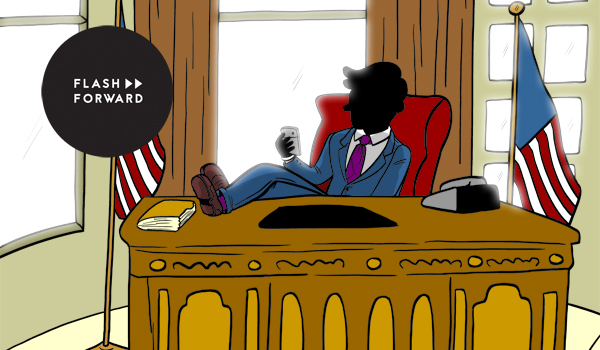

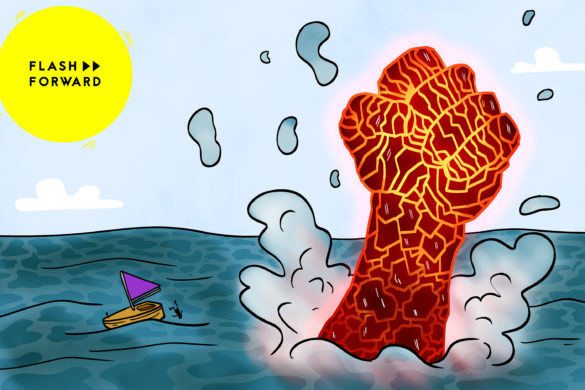

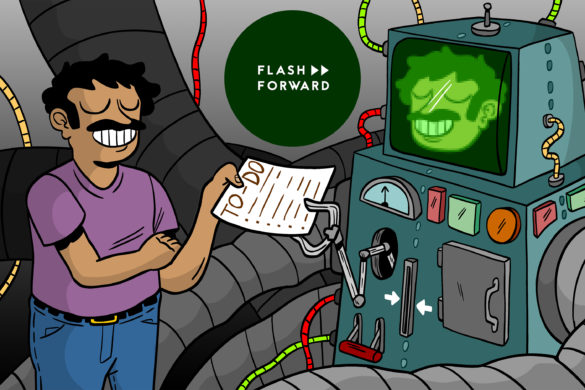
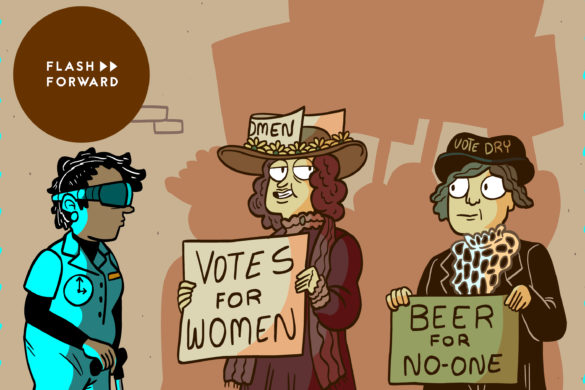
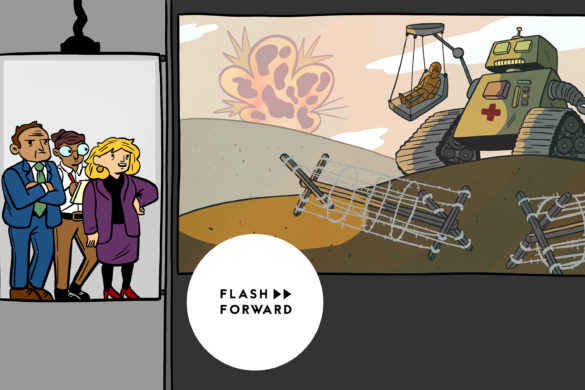
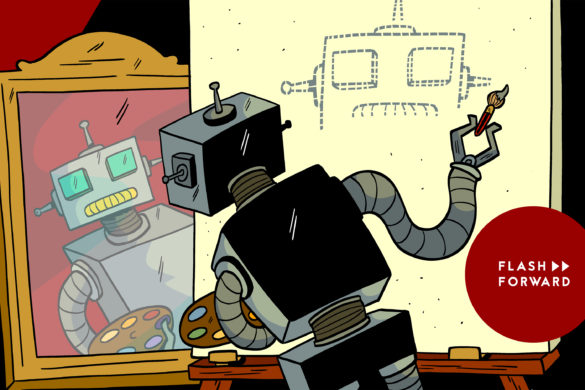
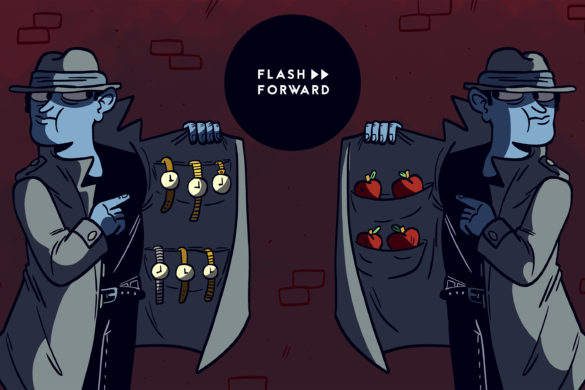
17 comments
I’m less worried about the political implications than I am about the implications for everybody. Many if not most office jobs come with a social media screening as part of the interview process these days. The idea that you could get knocked out of consideration because someone else tagged you in a photo from college where you may have been standing next to someone holding something questionable is sickening and horrifyingly real right now. People will have to come to some understanding in the future, not just for the sake of politicians, but for each other.
[…] https://www.flashforwardpod.com/2016/07/26/episode-18-revenge-of-the-retweet/ […]
Hello, I’m new to the Podcast but loving everything so far. Is there anywhere I could find the name of the intro song please?
Please ignore, I found it in the notes. Keep up the good work!
[…] ▹▹ Full show notes […]
[…] ▹▹ Full show notes […]
[…] ▹▹ Full show notes […]
[…] ▹▹ Full show notes […]
Oh, the problem of curated public lives is easy to solve. Money is required for that, as you’ve noted.
We simply ban anyone and everyone above a certain income from running for any public office. 🙂
[…] ▹▹ Full show notes […]
[…] will the public words of teens today mean for the adult leaders of tomorrow? The Revenge of the Retweet, from Flash […]
See, also as a bona fide young person, I disagree with the first guest. Am I careful with my social media? Yes, I try to be. Is it perfect? I doubt it. And there is no way that we can limit public office/any major positions to people who were perfectly well behaved as teenagers. It’s unrealistic. Frankly, there are a lot of lessons to be learned by going a little crazy when you’re young. I like to think that by the time that my generation is older, we’ll forgive your basic drunk pictures and stupid teenage opinions.
[…] en echt, ik ben groot fan – heeft hier ook weer een prachtige aflevering over gemaakt ’The revenge of the retweet’: “What happens, when today’s teens start running for office? When their entire internet […]
Hi Rose! Love the podcast!
I heard of this website and thought of you: accountkiller.com to try and delete your blog? I haven’t used it or anything but maybe it can help!
All the best! Keep up the awesome work!
[…] particular, el podcast de título “Revenge of the Retweets” se hace la siguiente […]
Most Trump supporters DO care about what he’s said, and don’t approve. What they DO approve of is the way that Trump speaks to them, and doesn’t hide the kind of individual he is. While I personally didn’t vote for Trump, a lot of people I love and care about did. People who did not like how far left Hilary went, people who desperately wanted a non-political person in the White House. People who did not trust the fact that the media kept pushing one candidate and if you disagreed you were absolutely horrible.
Why aren’t we talking about how it’s unacceptable for the slut shaming of Melania Trump? Aren’t we against this? That would be a good point to also show in this type of conversation. If we’re meant to accept that people have pasts, they are not always perfect, or what have you, shouldn’t this be also part of the conversation?
[…] Flash ForwardSynopsis: A podcast about possible (and not-so-possible) futures.This show has been pretty much my only source of hope for the last two years. I highly recommend it.Best episodes of the year: “Expiration Date”; “Revenge Of The Retweet” […]